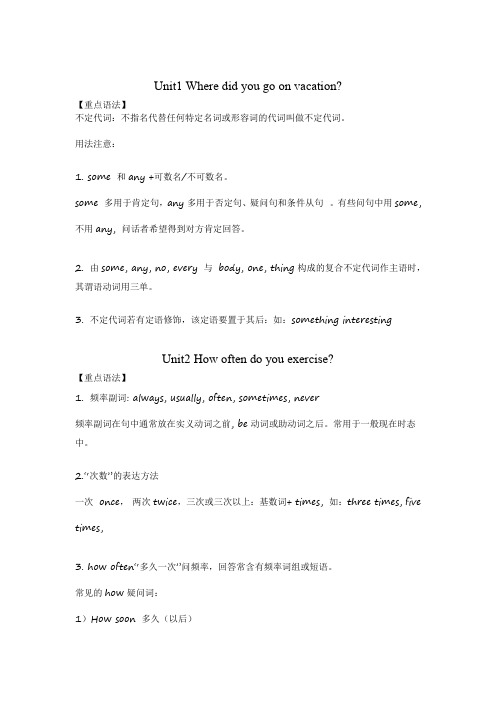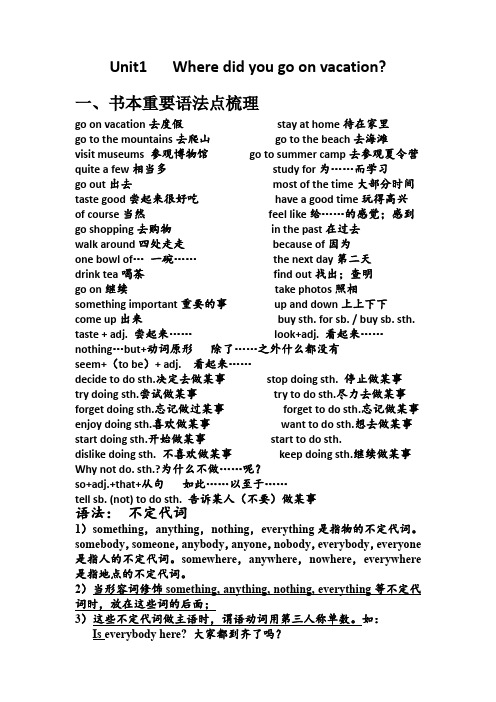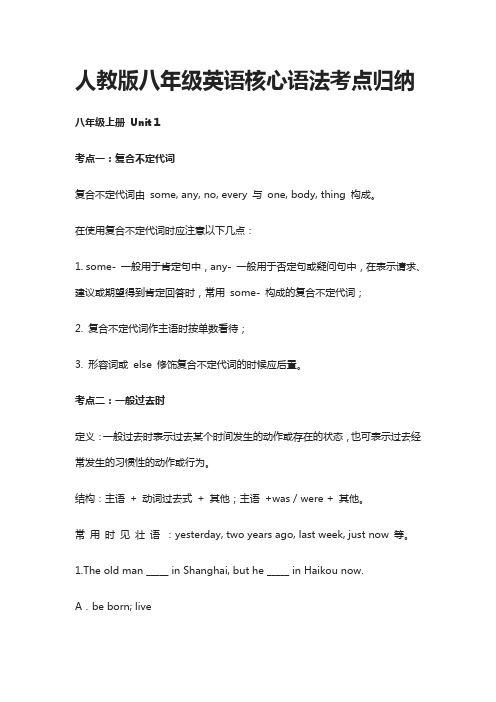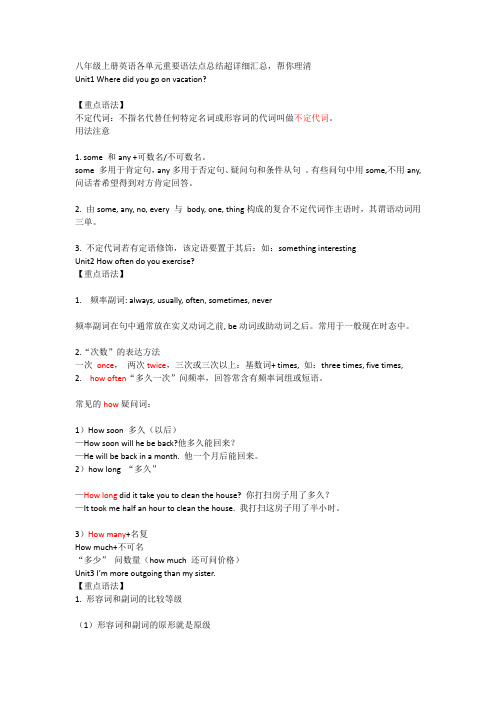八年级上Unit1重点语法总结
- 格式:doc
- 大小:35.00 KB
- 文档页数:2

Unit1 Where did you go on vacation?【重点语法】不定代词:不指名代替任何特定名词或形容词的代词叫做不定代词。
用法注意:1. some 和any +可数名/不可数名。
some 多用于肯定句,any多用于否定句、疑问句和条件从句。
有些问句中用some,不用any, 问话者希望得到对方肯定回答。
2. 由some, any, no, every 与body, one, thing构成的复合不定代词作主语时,其谓语动词用三单。
3. 不定代词若有定语修饰,该定语要置于其后:如:something interestingUnit2 How often do you exercise?【重点语法】1. 频率副词: always, usually, often, sometimes, never频率副词在句中通常放在实义动词之前, be动词或助动词之后。
常用于一般现在时态中。
2.“次数”的表达方法一次once,两次twice,三次或三次以上:基数词+ times, 如:three times, five times,3. how often“多久一次”问频率,回答常含有频率词组或短语。
常见的how疑问词:1)How soon 多久(以后)—How soon will he be back?他多久能回来?—He will be back in a month. 他一个月后能回来。
2)how long “多久”—How long did it take you to clean the house? 你打扫房子用了多久?—It took me half an hour to clean the house. 我打扫这房子用了半小时。
3)How many+名复How much+不可名“多少” 问数量(how much 还可问价格)Unit3 I’m more outgoing than my sister.【重点语法】1. 形容词和副词的比较等级(1)形容词和副词的原形就是原级(2)比较级,表示较……或更……(3)最高级,表示最…。


Unit1 Where did you go on vacation?一、书本重要语法点梳理go on vacation去度假stay at home待在家里go to the mountains去爬山go to the beach去海滩visit museums 参观博物馆go to summer camp去参观夏令营quite a few相当多study for为……而学习go out出去most of the time大部分时间taste good尝起来很好吃have a good time玩得高兴of course当然feel like给……的感觉;感到go shopping去购物in the past在过去walk around四处走走because of因为one bowl of…一碗……the next day第二天drink tea喝茶find out找出;查明go on继续take photos照相something important重要的事up and down上上下下come up出来buy sth. for sb. / buy sb. sth. taste + adj. 尝起来……look+adj. 看起来……nothing…but+动词原形除了……之外什么都没有seem+(to be)+ adj. 看起来……decide to do sth.决定去做某事stop doing sth. 停止做某事try doing sth.尝试做某事try to do sth.尽力去做某事forget doing sth.忘记做过某事forget to do sth.忘记做某事enjoy doing sth.喜欢做某事want to do sth.想去做某事start doing sth.开始做某事start to do sth.dislike doing sth. 不喜欢做某事keep doing sth.继续做某事Why not do. sth.?为什么不做……呢?so+adj.+that+从句如此……以至于……tell sb. (not) to do sth. 告诉某人(不要)做某事语法:不定代词1)something,anything,nothing,everything是指物的不定代词。

人教版八年级英语核心语法考点归纳八年级上册Unit 1考点一:复合不定代词复合不定代词由some, any, no, every 与one, body, thing 构成。
在使用复合不定代词时应注意以下几点:1. some- 一般用于肯定句中,any- 一般用于否定句或疑问句中,在表示请求、建议或期望得到肯定回答时,常用some- 构成的复合不定代词;2. 复合不定代词作主语时按单数看待;3. 形容词或else 修饰复合不定代词的时候应后置。
考点二:一般过去时定义:一般过去时表示过去某个时间发生的动作或存在的状态,也可表示过去经常发生的习惯性的动作或行为。
结构:主语+ 动词过去式+ 其他;主语+was / were + 其他。
常用时见壮语:yesterday, two years ago, last week, just now 等。
1.The old man _____ in Shanghai, but he _____ in Haikou now.A.be born; liveB.was born ; liveC.is born; livesD.was born; lives2. —Where were you last Saturday?—I ____ in the Capital Museum.A. amB. will beC. wasD. have been八年级上册Unit 2考点一:拼读副词频度副词表示动作或行为发生的频率。
常见的频度副词及其发生的频率如下表:考点二:how 疑问词组练一练3.()do you usually go to school,Simon? -by bike.A.WhenB.HowC.WhatD.Where(答案在文末获取)八年级上册Unit 3考点一:形容词和副词的比较级形容词和副词的比较能表示两者之间的比较关系,表示A 比B 更……,通常用than 来连接。

八年级上册英语各单元重要语法点总结超详细汇总,帮你理清Unit1 Where did you go on vacation?【重点语法】不定代词:不指名代替任何特定名词或形容词的代词叫做不定代词。
用法注意1. some 和any +可数名/不可数名。
some 多用于肯定句,any多用于否定句、疑问句和条件从句。
有些问句中用some,不用any, 问话者希望得到对方肯定回答。
2. 由some, any, no, every 与body, one, thing构成的复合不定代词作主语时,其谓语动词用三单。
3. 不定代词若有定语修饰,该定语要置于其后:如:something interestingUnit2 How often do you exercise?【重点语法】1.频率副词: always, usually, often, sometimes, never频率副词在句中通常放在实义动词之前, be动词或助动词之后。
常用于一般现在时态中。
2.“次数”的表达方法一次once,两次twice,三次或三次以上:基数词+ times, 如:three times, five times,2.how often“多久一次”问频率,回答常含有频率词组或短语。
常见的how疑问词:1)How soon 多久(以后)—How soon will he be back?他多久能回来?—He will be back in a month. 他一个月后能回来。
2)how long “多久”—How long did it take you to clean the house? 你打扫房子用了多久?—It took me half an hour to clean the house. 我打扫这房子用了半小时。
3)How many+名复How much+不可名“多少”问数量(how much 还可问价格)Unit3 I’m more outgoing than my sister.【重点语法】1. 形容词和副词的比较等级(1)形容词和副词的原形就是原级(2)比较级,表示较……或更……(3)最高级,表示最...。

Unit 1 where did you go on vacation ➢单词复习:任何人Anywhere 精彩的;极好的最多的;大多数的没有什么n.没有。
每人;人人.我自己你自己;你亲自hen pig似乎;好像无聊的;厌烦的;郁闷的Someone Diary 活动;活跃。
决定;选定Paragliding bird bicycle building trader惊奇;想知道;怀疑差异;不同顶部;顶等;等待湿的;雨天的低于;在。
..下面饥饿的;渴望的如同;像.。
一样HillDuck不喜欢;厌恶短语归纳1、go on vacation去度假 ,2、stay at home 呆在家,3、go to the mountains 上山/进山,4、go to the beach到海边去,5、visit museums 参观博物馆,6、go to summer camp 去夏令营,7、quite a few 相当多,8、study for为……学习,9、go out 出去,10、most of the time 大部分时间/绝大多数时间,11、taste good 尝起来味道好,12、have a good time玩的开心,13、of course当然可以,14、feel like(doing sth)感觉像……/想要,15、go shopping购物,16、in the past 在过去,17、walk around绕……走,18、too many 太多(可数名词前面),19、because of 因为,20、one bowl of 一碗……,21、find out 查出来/发现,22、go on继续,23、take photos 照相,24、something important重要的事情,25、up and down上上下下,26、come up出来➢习惯用法、搭配1. buy sth。
for sb.=buy sb. sth。

Unit1 Topic1 Section A语法:含有be going to +V原的一般将来时(P126)1.你将要去做什么?我将要去打篮球.2.喜欢做某事(经常性地)3.see的过去式saw看见某人经常做某事/做过了某事看见某人正在做某事,强调动作正在进行4.在暑假期间5.举办一场对抗3班的篮球赛against反对;倚着,靠着;撞到;映衬6.在星期天时间介词in, on, at 的用法:年月季节早晚in,at午夜时与分,具体某日上下午,星期日期全用on.7.我希望我们的队伍将会赢。
我也是.8.你愿意来为我们加油吗?当然,我愿意.为某人加油( sb是宾格, 因为跟在动词后)9. 你更喜欢哪一种运动,A or B ?prefer的用法:prefer + 名词= like +名词+ better如:I prefer apples = I like apples better prefer doing sth to doing sth 更喜欢做某事胜过做某事10.你划船多吗? 是的,非常多/ 不,很少。
(P2)11.你打算加入学校划船队吗?是的。
/不,我打算………(P2)13.区分:参加,加入(1)加入人或组织用:(2 ) 参加某项活动3个Unit1 Topic1 Section B1.你最喜欢什么运动?2.你最喜欢的运动员是谁?3.你知道关于他的一些事吗?4.他多高?他2.26米高。
(数词+名词+形容词)5.为…效力与…比赛和…玩6.我打算成为像他一样的篮球运动员。
7.那是我的梦想。
8.你长大后想当什么?我打算成为一名科学家。
(when引导时间状语从句,主将从现)What is he going to be when he grows up?9.在今后Unit1 Topic1 Section C1.非常喜欢2.骑自行车3.四“花费”①spend的两个词组(spend--spent)主语为人②pay for (pay--paid) 主语为人③cost (cost--cost)主语为物④take:It takes sb. some time to do sth. 主语为形式主语it4.爬山5.在体育馆6.擅长…7.学校运动会8.跳高9.跳远10.确信,确定(2个)①确定做某事be sure to do sth②对某事确定,有把握be sure of / about sth③be sure+that从句④be not sure+if / whether 从句11.There be句型的一般将来时结构:(there be中不能出现实义动词have)将有(2个)12.使某人/某物保持某种状态13.使某人做某事14.受…欢迎15.对什么有益反义词组16.全世界17.保持健康18.做某事的一个好方法19.她每天都在体育馆花费半小时锻炼。

人教版八年级上册英语Unit 1 知识点语法归纳总结Unit 1 Where did you go on n?During n time。
people have different ways of spending their time。
Some people choose to go on n。
while others prefer to stay at home。
Those who go on n have us ns。
such as going to the mountains。
visiting museums。
going to the beach。
or going to summer camp。
Quite a few people choose to study for exams during their XXX.When someone asks。
"Where did you go on n?" the answer could be anywhere。
For example。
"I went to New York City." If someone asks if you went out with anyone。
you might reply。
"No。
no one was here。
Everyone XXX." If XXX special。
you might say。
"Yes。
I bought something for my father."If someone asks how the food was。
you might say。
"Everything tasted really good." If you feel like going shopping。
you might say。

期末语法总复习Unit 1 讲义复合不定代词:一、带some 的不定代词,常用在中。
I bought for my parents,but nothing for myself.二、在表示和的疑问句中也用some- ,希望得到对方。
Would you like to eat ?Why didn’t you buy for yourself?三、带any 的不定代词,常用在和中。
I didn’t buy . = I bought .Did you go out with ?四、带any 的不定代词也可以放在肯定句中,表示。
I can do f or you.五、不定代词作主语,谓语动词用。
No one (be) here. Everyone (be) on vacation.Someone (want) to meet you.Everything (go) well.六、someone ,anyone ,everyone 指的是,且不和介词of 连用;some one ,any one ,every one 则既可指又可指,可与介词of 连用。
七、形容词修饰不定代词要:不定代词+形容词有意思的事情;特殊的人期末语法总复习Unit 1 练习1.—Allan is losing himself in books again.—Well, that's his favourite. He considers more important in his life than reading.A. everythingB.somethingC.anythingD.nothing2 .There isn't water in the cup.A .anyB .manyC .someD .the3 .The bottle is empty. There is in it.A .anythingB .somethingC .nothing4 .--“There isn't water here. Could you get for me?”--“All right.”A .some; someB .any; anyC .some; anyD .any; some5 .They were all very tired, but of them would stop to take a rest.A .anyB .someC .noneD .neither6 .Be quiet! I have to tell you.A .important anythingB .anything importantC .important somethingD .something important7. In China, red celebrations and people here this custom.A .is used for; are used toB .is used to; are used forC .is used to; are used toD .is used for; are used for8. Maria watch TV, but now she listening to music.A .used to;is used toB .is used to;used toC .used to;used toD .is used to;is used to9. Sue read newspapers after dinner but now she looking at Moments on We-chat.A .is used to, used toB .is used to, is used toC .used to, is used toD .used to, used to10. Those girls enjoyed in the party last night.A. themB. theyC. themselvesD. herself11. Help to some fish, children.A. yourselfB. yourC. yoursD. yourselves12. The film is very fun.A. it’sB. itselfC. itD. its13. –Who teaches math?–I teach .A. your, myselfB. you, myselfC. you, meD. you, herself14. The father will make a bike .A. her, himselfB. she, himselfC. her, herselfD. she, herself选词填空other, the other, others, the others, another1.What things can you see in the picture.2. I have two pens. One is red, is black.3. There are only five students in the classroom. What are ?4. There are a lot of people in the park. Some are walking, some are looking at the flowers, some are boating, are running.5. The jacket is too small for me. Would you show me one?。

八年级上英语知识点一单元在八年级上英语知识点一单元中,我们将重点学习英语中的基本语法、词汇以及听、说、读、写的技巧。
以下是本单元的具体内容:一、基本语法1.1 时态时态是英语中最核心、最基本的语法知识点之一。
在本单元中,我们将学习英语中的三个基本时态:现在时、过去时和将来时。
同时,我们还将学习如何使用这些时态来描述不同的动作和事件。
1.2 宾语宾语是一种语法成分,指动词的承受者或者动作的承受者。
在本单元中,我们将学习英语中的两种宾语:直接宾语和间接宾语。
同时,我们还将学习如何使用宾语来使句子更加完整和流畅。
二、词汇2.1 常用单词单词是学习英语中最基本的元素之一。
在本单元中,我们将学习英语中一些常用的单词,如人物、动物、食物等等。
通过学习这些单词,可以帮助我们更好地理解英语中的文本,并且提高我们的阅读和写作技能。
2.2 常用短语除了单词外,短语也是英语中非常重要的元素。
在本单元中,我们将学习英语中一些常用的短语,如问候语、道别语、日常用语等等。
通过学习这些短语,可以帮助我们更好地进行日常交流。
三、听、说、读、写技巧3.1 听力技巧何有效地听懂英语中的对话和文章。
为了提高听力技能,我们可以通过多听英语录音、多模仿英语语音等方式来锻炼。
3.2 说话技巧说话是英语中最基本的技能之一。
在本单元中,我们将学习如何流畅地用英语进行日常对话。
为了提高说话技能,我们可以通过多练习英语口语、多与外国人交流等方式来锻炼。
3.3 阅读技巧阅读是英语中最基本和重要的技能之一。
在本单元中,我们将学习如何准确理解英语中的文章和阅读材料。
为了提高阅读技能,我们可以通过多读英语文章、多背英语句子等方式来锻炼。
3.4 写作技巧学习如何清晰流畅地写出英语文章和句子。
为了提高写作技能,我们可以通过多写英语日记、多写英语作文等方式来锻炼。
总的来说,在八年级上英语知识点一单元中,我们将学习英语中的基本语法、词汇以及听、说、读、写的技巧。

语法小结1、第一单元主要学习的时态是过去时。
(1)一般过去时态,表示过去某个时间发生的动作或存在的状态,常与表示过去的时间状语连用,如“yesterday”、“last month”、“ten minutes ago, in 2004”等Eg: I went to the 200 last week.(2)一般过去时还可表示过去的习惯性动作,常用“used to”表达,意为“过去常常”。
Eg: I used to go to school on foot.(3)通过上下文判断动作发生在过去的,也用过去时。
A: Where did you go?B: I went to my uncle’s.2、一般过去时的肯定句、否定句和疑问句的构成。
(1)肯定句:主语+动词过去式。
Eg: She was a student ten years ago.(2)否定句:主语+was/were+not或主语+didn’t+动词原形。
Eg: They weren’t here just now.Tim didn’t play soccer yesterday afternoon.(3)一般疑问句:was/were+主语+…或Did+主语+动词原形+……?Eg: Were you at home yesterday?Did she go shopping last weekend?(4)特殊疑问句:特殊疑问句+一般疑问句?Eg: When did you go to the park?What did they do last night?3、动词过去式的构成。
(1)规则变化。
①一般情况在动词的词尾加ed.play—played work—worked②以不发音字母e结尾的在词尾加d.like—liked practice—practiced③末尾只有一个辅音字母的重读闭音节词,双写这个辅音字母再加ed.stop—stopped plan—planned④以辅音字母加y结尾的动词变y为i再加ed.study—studied worry—worried(2)不规则变化见教材后面的动词表。

八年级上册英语unit1语法知识点总结本篇文章将对八年级上册英语unit1中的语法知识点进行总结,以帮助同学们更好地学习英语。
主要涉及以下内容:疑问句、不定冠词、冠词与名词、代词、名词所有格、There be句型、现在进行时。
I. 疑问句在英语中,疑问句需要用特殊的语序,即将谓语动词提前,使得句子开头为疑问词或助动词。
例如:1. What do you like to eat for breakfast?2. Have you finished your homework?需要注意的是,疑问词和助动词的使用是根据不同的情况而不同的,需要同学们做好分类记忆。
II. 不定冠词不定冠词a/an的使用需要根据名词的首字母来决定。
当名词的首字母是元音字母时,使用an;当名词的首字母是辅音字母时,使用a。
例如:1. He bought an apple for his daughter.2. I need a pen to write a letter.需要注意的是,有些以元音字母开头的名词实际上却读作辅音,需要根据发音来决定使用哪种冠词,例如:1. A university2. An hourIII. 冠词与名词冠词的使用需要根据名词的特定情况而不同,一般分为定冠词the和不定冠词a/an两种。
举个例子:1. The sun is shining brightly.2. A bird is singing on the tree.需要注意的是,在某些情况下名词不需要使用任何冠词,例如:1. I like sports.2. He is good at math.IV. 代词代词是用来代替名词的特殊词汇,常见的代词有人称代词、指示代词、不定代词等。
例如:1. He is my friend. → He is my best friend.2. This is my book. → That is his book.需要注意的是,代词在使用时需要遵循一些规则,例如人称代词需要根据主语的性别、单复数等进行变化,需要同学们做好相应的归纳和记忆。

八年级上学期英语unit1语法要点整理八年级上学期英语unit1语法要点整理1.—Peter,couldyoupleasetakeoutthetrash?—Sure,Mom.—Couldyoupleasedothedishes?—Sorry,Ican’t.Ihavetodomyhomework.(1)在表示请求帮助或请求允许的疑问句中,常用could代替can,以表示礼貌,委婉或不确定的语气,而can则不具备这些语气。
这种情况下不能把could看作can的过去式。
以上两句中用could是为了表示礼貌的请求。
表示请求帮助或请求允许时,除了can,could之外,还可以用may,句子的表达方式也各有不同,可以用不同的方式来表示同一个概念。
例:①Could/Can/MayIuseyourcarforaday?②IwonderifIcoulduseyourcarforaday?③DoyoumindifIuseyourcarforaday?对于①、②句所作允答可以各种各样,如同意可以说Yes,或Sure或Certainly,还可说Yes,(do)please.或Ofcourse.(youmay/can).或Goahead,please.或That’sOK/allright.如果不同意,可以说I’msorryyoucan’t.或I’mreallysorry,butIhavetouseittoday.要避免说No,youcan’t.这样显得很不礼貌。
否定回答通常用委婉语气。
对于句(3)所作回答可以说Nevermind./Notatall.表“不介意”。
不能用Yes./Sure./Ofcourse./Certainly.等。
无论肯定还是否定应答中,要避免使用could,要用can或may。
因为应答须用确定的语气。
而could在表请求的问句中是为了表示礼貌或委婉语气,用在应答中则成了不确定语气,与情理不符。
所以应答中不说Yes,youcould.或No,youcouldn’t.而要说Yes,youcan.或Sorry./No,youcan’t.(2)区别动词do和make。

八年级上册英语Unit 1知识点与语法精讲精练词汇梳理(一)完成单词梳理:名词:1. hen母鸡 2. pig 猪 3. diary 日记;记事簿4. activity 活动5. paragliding 滑翔伞运动6. bird 鸟7. bicycle 自行车8. building 建筑物;房子9. trader 商人10. difference 差别;差异11. top 顶部;表面12. umbrella 伞;雨伞13. hill 小山;山丘14. duck 鸭动词:1. seem 好像;似乎;看来 2. decide 决定;选定 3. wonder 想知道;琢磨4. wait 等待;等候代词:1. anyone 任何人 2. something 某事;某物 3. nothing 没有什么4. everyone 每人;人人;所有人5. myself 我自己;我本人6. yourself 你自己;您自己7. someone 某人副词:1. anywhere 在任何地方形容词:1. wonderful 精彩的;绝妙的 2. bored 厌倦的;烦闷的3. enjoyable 有乐趣的;令人愉快的4. wet 湿的;潮湿的5. hungry 饥饿的兼类词:1. few (adj/pron)不多;很少 2. most (adj/adv/pron)最多;大多数3. try (n/v)尝试;设法;努力4. below (prep/adv)在……下面5. enough (adj/adv)足够的(地)6. dislike (v/n)不喜爱(的事物)7. as (adv)像……一样(conj)当……时;如同(二) 词汇变形小结:1. wonder (v. 想知道) — wonderful (adj. 精彩的;绝妙的) — wonderfully (adv. 精彩地)2. bore (v. 使……厌烦) — bored (adj.厌倦的)— boring (adj.令人厌倦的)3. diary (n. 日记) — diaries (复数)4. enjoy (v. 喜爱) — enjoyable (adj. 有乐趣的;令人愉快的)5. activity (n. 活动) — activities (复数)6. decide (v. 决定) — decision (n. 决定)7. build (v. 建造) — building (n. 建筑物;房子)8.trade (n/v贸易;买卖) — trader (n. 商人)9. difference (n. 差别;差异) — different (adj. 不同的)10. wait(v. 等候;等待) — waiter (n. 男服务员) — waitress (n. 女服务员)11. like(v. 喜欢)— dislike 反义词()【练一练】用所给词的适当形式填空1.–Mom. I plan to wash clothes by ___myself____(I) this summer vacation.Good girl! Go for it.2.Can you tell me some __differences___(different) between the two pictures?3.The students have quite a few activities (activity) after class. They can sing, dance and play basketball.4.I think it will be a very enjoyable (enjoy) trip for you to travel to Beijing.5.His cousin is a trader (trade), selling fruit and vegetables.6.The TV show is really boring (bore). I don’t want to watch it.7.As a teacher, Mr. Green always tries to make his lessons _enjoyable__(enjoy).8.This film is _wonderful___ (wonder). I like to see it very much.9.I can look after __myself____(my). Don’t worry about me.10.You must look after __yourself____(you) well while I'm away, Tom.(三) 短语攻关:go on vacation去度假stay at home 待在家里go out 出去quite a few 相当多;不少most of the time大部分时间of course当然have a good time=enjoy oneself 玩得高兴feel like 给……的感觉;感觉像take photos 拍照;照相keep a diary 写日记buy sth for sb 买某物给某人decide to do sth 决定做某事something important 重要的事find out 找出;查明in the past 在过去make a difference 产生影响;起作用enjoy doing sth喜欢做某事too many 太多arrive at/in 到达because of 因为;由于wait for 等待;等候start to do /doing sth开始做某事知识点梳理1.We took a few photos there.我们在那里拍了很多照片。

英语八年级上册知识点归纳Unit1 Where did you go on vacation?【重点语法】不定代词:不指名代替任何特定名词或形容词的代词叫做不定代词。
用法注意:1. some 和any +可数名/不可数名。
some 多用于肯定句,any多用于否定句、疑问句和条件从句。
有些问句中用some,不用any, 问话者希望得到对方肯定回答。
2. 由some, any, no, every 与body, one, thing构成的复合不定代词作主语时,其谓语动词用三单。
3. 不定代词若有定语修饰,该定语要置于其后:如:something interesting【重点短语】1. buy sth for ab./ buy sb. sth 为某人买某物2. taste + adj. 尝起来……3. nothing...but + V.(原形) 除了……之外什么都没有4. seem + (to be) + adj 看起来5. arrive in + 大地方/ arrive at + 小地方到达某地6. decide to do sth. 决定做某事7. try doing sth. 尝试做某事/ try to do sth. 尽力做某事8. enjoy doing sth. 喜欢做某事9. want to do sth. 想去做某事10. start doing sth. 开始做某事=begin doing sth.11. stop doing sth. 停止做某事区分:stop to do sth. 停下来去做某事12. dislike doing sth. 不喜欢做某事14. so + adj + that + 从句如此……以至于……16. tell sb. (not) to do sth. 告诉某人(不要)做某事17. keep doing sth. 继续做某事18. forget to do sth. 忘记去做某事/ forget doing sth 忘记做过某事【词语辨析】1. take a photo/ take photos 拍照quite a few+名词复数“许多…”2. seem + 形容词看起来…... You seem happy today.seem + to do sth. 似乎/好像做某事 I seem to have a coldIt seems + 从句似乎..…. It seems that no one believe you. seem like ... 好像,似乎….. It seems like a good idea.3. arrive in +大地点= get to= reach+地点名“到达......”arrive at +小地点(注:若后跟地点副词here/there/home, 介词需省略,如:arrive here; get home)4. feel like sth 感觉像…feel doing sth. 想要做某事5. wonder(想知道)+疑问词(who, what, why)引导的从句。
Unit 1 重点语法总结
(一)一般过去时
一般过去时表示过去某个时间发生的动作或存在的状态,也表示过去经常或反复发生的动作
结构:(1)主系表:主语+was/were+其他
(2)主谓宾:注意+谓语动词(过去式)+宾语
例如:I was very happy yesterday.(主系表结构)
I played basketball in the morning.(主谓宾结构)
考点1:如何判定一般过去时?
考向一:通过句子当中是否有表示过去的时间状语来判定。
(1)介词+表示过去时间的年、月、日,如:in 1983;
(2)yesterday以及由yesterday构成的短语:yesterday
morning/afternoon/evening(昨天早上/下午/晚上),the day before yesterday (前天);
(3)带有ago的短语如:three days ago(三天前),five years ago(五年前);(4)last构成的短语如:last week/year/month;
(5)表示过去的词或者短语:once(曾经), at that time(在那个时候), just now(刚刚);
考向二:如果找不到明显的时间状语,则通过上下文判断。
如:——Where did you go?
——I went to the beach.
考向三:两个或两个以上的动词用and连接时,如果前一个动词为过去式,后面的动词也要用过去式。
如:I got up, brushed my teeth and ate my breakfast.
考点2:肯定句如何变为否定句?
(1)含有系动词was或were的直接在后面加系动词后面加not
(2)含有实义动词,在该动词前加did not/didn’t,并且该动词变为原形
如:It was sunny and hot yesterday.→It was not sunny and hot yesterday.
He played football yesterday.→He didn’t play football yesterday.
考点3:陈述句如何变一般疑问句或和特殊疑问句?
(1)若句中有be动词或情态动词,则把它们移到句首;
(2)若句中是行为动词,则在句首加Did,动词变为原形;
(3)特殊疑问句只需在一般疑问句句首加上特殊疑问词即可。
例如:(变为一般疑问句)
Everyone was on vacation.→Was everyone on vacation?
I went to Now York City.→Did you go to Now York City?
(变特殊疑问句,就划线部分提问)
The food was delicious!→How was the food?
I went to the mountains on vacation.→Where did you go on vacation? (二)不定代词的用法
不指明代替任何特定名词或形容词的代词叫做不定代词。
本单元主要学习了复合不定代词,列表如下:
考点1:以some, any, no, every构成的复合不定代词作主语时,谓语动词用第三人称单数形式。
例:Something is wrong with my watch.我的手表坏了。
考点2:形容词修饰复合不定代词时,形容词后置。
例:Did you do anything special?你做了不寻常的事情吗?
考点3:复合不定代词可以加动词不定式,不定代词作后置定语。
例:I really have something to do.我真的有事要做。